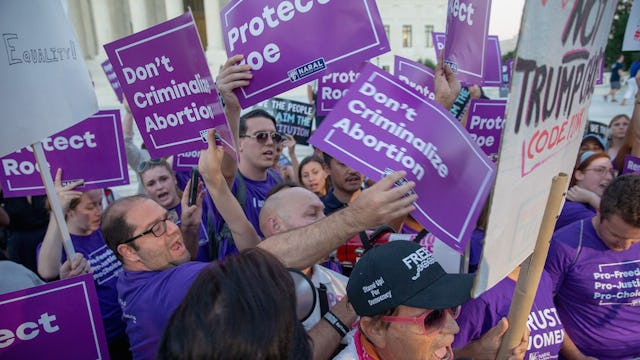Women's Access To Abortion Improves Children's Lives

Women who are denied abortion are more likely to live in poverty with their kids and need public assistance — and that’s not all
A new series of studies that examine what happens when a woman is denied access to abortion services has found that both the existing and future children of those women suffer – in multiple ways.
Called the Turnaway Study, the group of studies is the first of its kind to focus on the long-term outcomes of women who wish to terminate their pregnancy but are denied services. It finds that kids have better lives when women have the ability and resources to choose when to have a child.
The studies are all based on 328 women across the country, about half of which had an abortion just below the gestational age limit and about half of which were turned away because they just missed the gestational age limit. The women were followed for a five-year period, between January 2008 and January 2016, as they navigated the world, raised their children, and had future children.
What researchers found was that everyone is harmed when women are denied a wanted abortion: the woman herself, her existing kids, and her future children are all at a disadvantage. At the same time, women who were able to secure an abortion when they had made that choice saw improved lives for themselves, their existing kids, and their future kids.
The first of the studies found that there was a poorer bonding between mothers and babies when abortion access was denied, compared with mothers who had children in the years after their chosen abortion – women who couldn’t have an abortion were more likely to report feeling trapped or having resentment toward their child. It also found that moms who didn’t have access to abortion were significantly more likely (72% versus 55%) to live in poverty and significantly more likely to live without basic essentials (87% versus 70%) like enough food, adequate shelter, and safe transportation.
A second study, published in the Journal of Pediatrics, again found that kids in households where abortion access was denied were significantly more likely to live under the poverty level, and also that kids had lower mean child developmental scores.
A third Turnaway study looked at the pattern of intended pregnancy after a planned abortion (or after an abortion was denied). Women who were granted abortions when wanted were more likely to have an intended pregnancy in the years that followed – making the point that might seem obvious to some: “Being able to access abortion gives women the opportunity to have a child when they decide it is the right time.”
The lead researcher on the study, and the Director of Research, UCSF Advancing New Standards In Reproductive Health, Dr. Diana Greene Foster, PhD, explained that women are strained emotionally and financially by unwanted pregnancies.
“Women who have unwanted pregnancies are juggling a lot of responsibilities. Some make the decision to abort a pregnancy because they want to be able to take care of the children they already have,” she told Scary Mommy. “This study shows that if women can’t get a wanted abortion, it negatively affects their existing children. And it may also limit their ability to have a wanted child later.
Other findings from the Turnaway study have also found that the women themselves don’t fare as well when they’re denied abortions. Just to list a few findings, these women were more likely to live in poverty, raise children alone, and stay tethered to an abusive partner, and less likely to have and achieve aspirational plans for the future.
Dr. Foster stressed that these studies don’t just mean that we need to keep abortion legal in the United States – we have to think about keeping abortion accessible as well.
“Already in the US, many women are not able to get an abortion,” she said. “We estimate that over 4000 women are unable to get wanted abortions just due to gestational limits. Many others don’t get an abortion because they can’t afford one or can’t get to a clinic. So even with abortion being legal, it isn’t always accessible.”
If denying access to abortion hurts women and kids, where does that leave pro-lifers?
“If someone is pro-life, meaning that they want women and children to have the best life possible, they should be interested in women having control over the timing of their births,” said Dr. Foster. “When women are able to decide whether and when to bring a child into the world, they are better able to take care of the children they already have and to plan to have children at a time that they can provide all the emotional and material resources a child needs.”
The big takeaway? Women who have greater control over when they have kids are better able to care for their kids. In turn both their existing kids and their future kids are more likely to hit developmental milestones, more likely to have enough food in their tummies, and more likely to have everything they need to be happy, healthy, and successful.